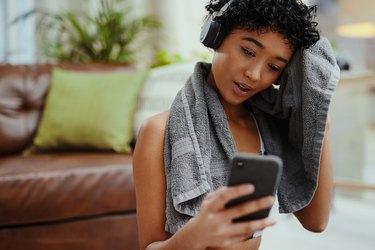
Including a sweat session in your day is a healthy routine to have, but what happens when you find yourself sweating for hours after a workout?
We spoke to Dean Somerset, CSCS, an exercise physiologist and kinesiologist, to understand why you might experience prolonged post-exercise perspiration and ways to stop it.
Video of the Day
Video of the Day
First, Why Do We Sweat?
Your body is designed to sweat during a workout. When you exercise, the work you're doing gets exerted as mechanical energy (muscles contracting) and heat, Somerset says.
The way you release this heat is through sweat. It's how your body regulates its temperature. Sweat lowers your body temperature as it evaporates from your skin, according to Houston Methodist.
Even after you've finished your workout, your body continues to produce heat and sweat. "It can take a while for your core temperature and metabolic rate to return to normal," Somerset says.
And it's worth noting: Some people sweat a lot more easily than others. This isn't a sign that your body is functioning more (or less) efficiently, but rather an indication that your heat production and regulation systems are at work, Somerset says.
6 Causes of Sweating After a Workout
1. Working Out at a High Intensity
Often, how quickly you stop sweating after a workout depends on how hard you pushed during the session. For example, a max-effort cardio session is a lot more sweat-inducing than casually lifting light weights, Somerset says.
2. Skipping the Cooldown
If you can't stop sweating after a workout, it could be a sign that you're not giving your body enough time to gradually lower its temperature
3. Jumping Straight Into the Shower
If you're still sweating bullets after a workout, a shower will be more performative than beneficial, especially if the water is warm, Somerset says. That's because being in a hot, humid environment will limit evaporation and prolong the sweat response, he says.
4. Eating or Drinking Something Hot
If you gulp down a scalding hot coffee or nosh on spicy foods after your workout, you can bet on prolonged sweating, Somerset says.
5. Wearing the Wrong Workout Gear
Choosing clothes that don't breathe (or piling on multiple layers) can produce a plethora of perspiration, Somerset says.
6. Living Somewhere Humid
If you live in a tropical climate (or the summertime brings rain-forest levels of humidity), losing heat through evaporation (i.e., sweat) is a lot harder, Somerset says.
"Canada in the winter? Easy to stop sweating after you've crushed your session. Florida in the summer? It's going to be a lot harder to keep your shirt dry."
6 Ways to Stop Sweating After a Workout
Here, Somerset shares simple strategies to scale back sweating after your workout.
1. Wear Cooler Clothes
Dress for success. Choose lightweight fabrics that advertise sweat-wicking properties. As a general rule, avoid 100 percent cotton in your workout clothes, which can trap sweat and prevent it from quickly evaporating.
2. Do a 5- to 10-Minute Post-Workout Cooldown
The goal is to lower your heart rate and slow your metabolic rate. Shoot for about a 50-percent reduction in heart rate (from your peak heart rate during activity) or continue your cooldown until your post-workout heart rate falls within 10 to 20 beats per minute of your resting heart rate, Somerset says.
3. Wait Before Showering and Use Cooler Water
Before hitting the shower, wait until your breathing and heart rate are close to normal resting levels, Somerset says. Again, a 5- to 10-minute cooldown should do the trick. Then shower with the coldest water you can tolerate without turning blue for another 5 to 10 minutes, he says.
4. Hydrate With Cold Water
"Most people don't drink enough, so getting more cold water is universally a good idea," Somerset says.
5. Stand in Front of a Fan or A/C
"This can definitely help speed the evaporative effects of sweating and lead to reductions in how much heat you produce," Somerset says. Let the air flow hit your skin directly for best results.
6. Apply a Cold Compress
Placing an ice pack on the back of your neck can slash your sweating. For maximum cooling, stand in front of a fan with an ice pack about a millimeter from your skin, Somerset says.
When to See a Doctor
If you've tried everything and are still experiencing profuse perspiration long after a workout, your excessive sweating could be a signal of an underlying health issue.
For instance, you could have hyperhidrosis, a condition where the sweat glands produce more sweat than necessary, according to Harvard Health Publishing. People with hyperhidrosis usually experience excessive sweating on the palms, feet, face, armpits and groin. In really bothersome cases, medications and other treatments can help.
Persistent sweating could also indicate a hormonal problem, infection, anxiety disorder or, in rare cases, cancer, per Harvard Health Publishing. Don't worry. Just talk with your doctor. They can help determine a diagnosis and provide proper treatment options.
- Harvard Health Publishing: "What to do About Excessive Sweating?"
- American Osteopathic Association: "Don't Lose Sleep Over Night Sweats"
- Mayo Clinic: "Night Sweats When to See a Doctor"
- International Hyperhydrosis Society: "Worksheet"
- American Academy of Dermatology: "Hyperhydrosis"
- Houston Methodist: "How Sweat Works: Why We Sweat When We're Hot, as Well as When We're Not"